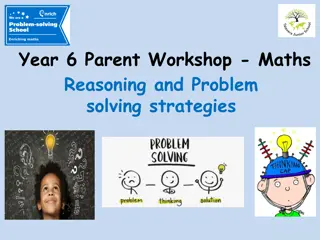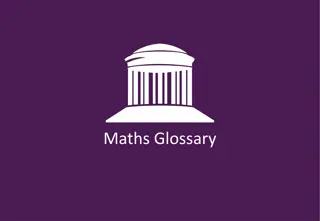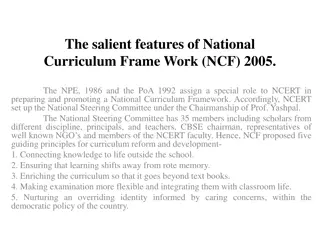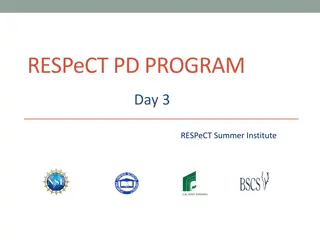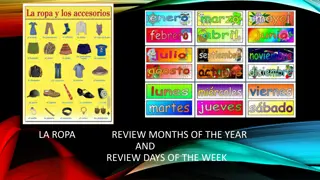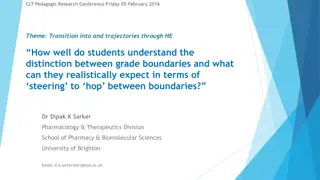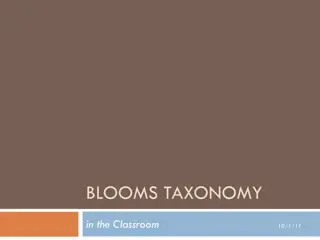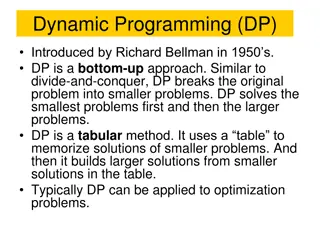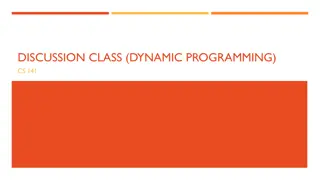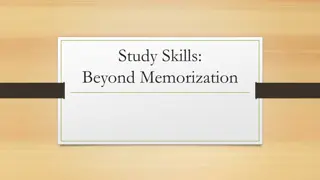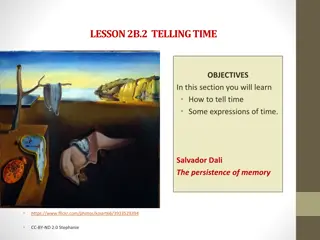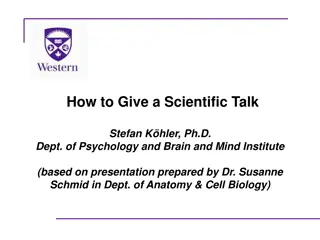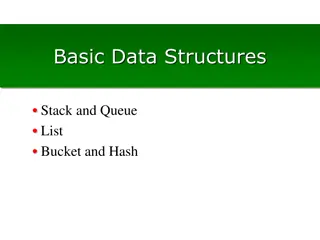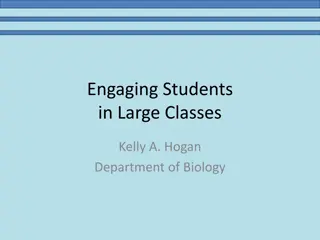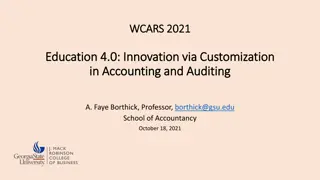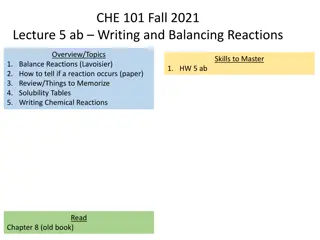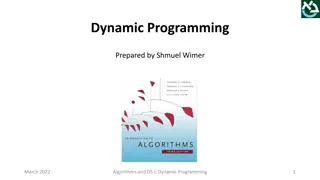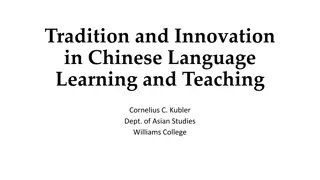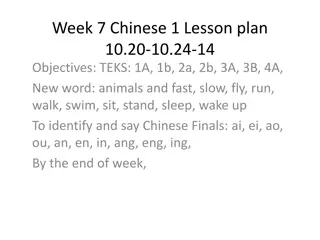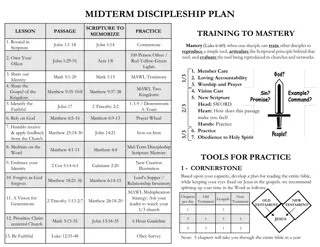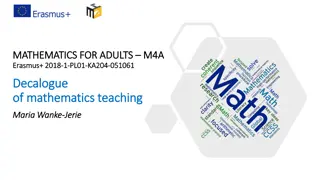Enhancing Math Skills for Year 6 Students Through Reasoning and Problem-Solving
Explore the shift towards math mastery, reasoning, and problem-solving strategies in Year 6 parent workshops. Learn why these methods differ from traditional approaches, emphasizing understanding over rote memorization. Discover the key skills needed for mathematical reasoning and how to support you
0 views • 23 slides
Effective Strategies for Teaching Mathematics: Concrete, Pictorial, Abstract Approach
Utilizing concrete manipulatives, pictorial representations, and abstract symbols is a crucial method for enhancing mathematical understanding. This approach guides students from hands-on exploration to visual representation and ultimately to solving problems with symbols. By engaging in this progre
1 views • 25 slides
National Curriculum Framework (NCF) 2005 - Salient Features Summary
The National Curriculum Framework (NCF) 2005 outlines significant changes in education, focusing on connecting knowledge outside of school, moving away from rote memorization, enriching the curriculum beyond textbooks, making examinations more flexible, and nurturing an identity rooted in caring and
0 views • 7 slides
Pedagogical Shift in Physical Science: Constructing Knowledge Through Learner-Centered Experiences
There is a significant pedagogical shift in physical science education from viewing science as a fixed body of knowledge to emphasizing the process of constructing knowledge. Learners are now placed at the center stage, engaging in inquiry-based learning, critical thinking, and collaborative interac
3 views • 21 slides
Effective Exam Revision Strategies for Success
Get ready for your exams by planning your revision, developing key skills like time management and note-taking, and understanding effective revision techniques. Make use of long-term and short-term schedules, organize your notes, and use mnemonic devices to aid memorization. Stay focused, manage str
0 views • 14 slides
Enhancing Science Learning Through Student Thinking Strategies
Explore Day 3 of the RESPeCT Summer Institute focusing on STL strategies, lesson analysis, traits variation, and student engagement in scientific thinking. Uncover trends in reflections, student questions, and activities that advance science learning without rote memorization. Delve into the purpose
0 views • 67 slides
Exploring the Folklore and Music of the 1800s
Dive into the rich traditions and customs of the uncultured classes as defined by William Thoms in 1846. Discover how the low literacy rate in the 1800s led to the significance of memorization and the use of music to convey religious imagery. Explore the various musical instruments like guitars, ban
0 views • 13 slides
Spanish Vocabulary Review: Months of the Year and Days of the Week
Practice and memorize Spanish vocabulary related to clothing items and weather phrases, including months of the year and days of the week. Improve your language skills using helpful resources and tips for effective memorization.
0 views • 6 slides
Understanding Students' Perception of Grade Boundaries in Higher Education
Research presented at the CLT Pedagogic Research Conference explores students' expectations and understanding of grade boundaries in higher education. The study reveals a disconnect between effort, time spent on assignments, and actual grades received. Many students strive for high grades without fu
0 views • 27 slides
Understanding Blooms Taxonomy in Educational Settings
In the classroom, understanding Bloom's Taxonomy is essential for effective teaching and learning. This taxonomy, created by Benjamin Bloom, categorizes levels of thinking skills from basic memorization to higher-order critical thinking. The revised Bloom's Taxonomy emphasizes the importance of prog
0 views • 24 slides
Introduction to Dynamic Programming: A Powerful Problem-Solving Technique
Dynamic programming (DP) is a bottom-up approach introduced by Richard Bellman in the 1950s. Similar to divide-and-conquer, DP breaks down complex problems into smaller subproblems, solving them methodically and storing solutions in a table for efficient computation. DP is widely used in optimizatio
0 views • 39 slides
Dynamic Programming in Computer Science: Maximizing Smartness on a Plane
Discussing the application of dynamic programming in Computer Science class, specifically solving a problem of maximizing total smartness of students seated in a plane. The discussion covers strategies like memorization, recursion, base cases, and an algorithm to achieve the optimal solution. It als
0 views • 12 slides
Enhancing Study Skills: Moving Beyond Memorization
In the realm of studying, focusing solely on memorization may not be sufficient for success. This article delves into the limitations of studying for memorization, the importance of developing thinking skills, and provides a sample process using apartheid as an example to illustrate steps beyond mer
0 views • 18 slides
Illustrated Irregular Verbs for Learning English Vocabulary
Explore a visual collection of irregular English verbs through engaging images. Each verb is paired with its past simple and past participle forms to aid in learning and memorization. Enhance your language skills with this creative approach to mastering irregular verbs.
0 views • 40 slides
Learning to Tell Time: Essential Tips and Expressions
In this section, you will learn how to tell time using expressions such as "Quelle heure est-il?" (What time is it?) and different methods for telling time based on the hour. You will also discover expressions for specific times of the day and how to differentiate between telling time and expressing
0 views • 4 slides
Effective Scientific Talk Presentation Tips
Learn to give a scientific talk successfully by understanding your topic, audience, and goals. Gather essential materials, draft an outline, and structure your talk clearly from beginning to end. Practice speaking fluently without relying on reading or memorization to engage your audience effectivel
0 views • 14 slides
Mastering Extemporaneous Speaking: 6 Steps for Success
Extemporaneous speaking is a well-prepared speech delivered without reading or memorization. Key steps include picking a topic, crafting a thesis, selecting supporting points, and practicing delivery. Participants have 30 minutes to prepare a seven-minute speech on national issues.
0 views • 20 slides
Spanish Colors Vocabulary and Practice for October
Explore essential Spanish vocabulary related to colors, phrases, nouns, and adjectives for the first part of October. Encourage learning and memorization through interactive websites and engaging phrases. Practice pronunciation and engage in online activities to enhance comprehension. Prepare for a
0 views • 5 slides
Spanish Colors and Phrases Learning Resources for Kids
Explore fun websites and phrases to learn Spanish colors with your child in preparation for an upcoming quiz. Practice pronunciation and memorization using engaging online resources and study tips. The quiz will test oral knowledge of colors and phrases, making learning enjoyable and interactive.
0 views • 5 slides
Understanding Electronic Configurations Through Simplified Assignments
Exploring electron configurations and orbital regions using simplified notations colored in on Periodic Charts. Descriptions and visual aids for Carbon, Fluorine, and excited state of Fluorine. Learn to assign s, p, d, and f electron neighborhoods without memorization through a fun song. Includes te
0 views • 14 slides
Understanding Basic Data Structures for Efficient Data Memorization
Memorization is a fundamental function in computing, and the efficiency of this process depends on the data structure used. Learn about different ways of memorization, structuring memory units, and the implementation of stacks for storing and retrieving data efficiently.
0 views • 44 slides
Understanding Bloom's Taxonomy of Learning Domains
Bloom's Taxonomy, developed in 1956, focuses on promoting higher-order thinking in education. It categorizes learning into three domains: Cognitive (knowledge), Psychomotor (manual skills), and Affective (attitude). While Bloom's committee initially omitted the Psychomotor domain due to teaching lim
0 views • 19 slides
Strategies for Engaging Students in Biology Classes
Explore innovative teaching methods to move beyond memorization to foster scientific reasoning and student responsibility in biology education. Learn about effective strategies like reducing lecture time, utilizing online resources for base-level content, and providing ample practice for higher-leve
0 views • 36 slides
Enhancing Accounting and Auditing Education through Innovation
Innovation in accounting and auditing education is crucial for developing students' analytical mindset, improving data analytics curricula, and addressing the shortcomings of traditional accounting education. The need for innovation is demonstrated by students' limited ability to apply analytics, fa
0 views • 10 slides
Chemical Reactions: Writing, Balancing, and Mastering Skills
Explore the essential topics of balancing chemical reactions, determining reaction occurrence, memorization tips, and using solubility tables. Master the art of writing and balancing reactions through fundamental rules, techniques, and practice examples. Understand the basics of chemical reactions,
0 views • 20 slides
Understanding Dynamic Programming in Algorithms and Data Structures
Dynamic programming, as explained by Shmuel Wimer in March 2022, delves into solving optimization problems efficiently by breaking them down into simpler sub-problems and avoiding repeated computations. The process involves considering various approaches such as recursive solutions, top-down and bot
0 views • 22 slides
Tradition and Innovation in Chinese Language Learning
Continuous innovation is crucial in Chinese language teaching while preserving the value of traditional methods. Strategies like memorization help students internalize language effectively, leading to improved communicative competence. Utilizing model conversations and drills can enhance vocabulary,
0 views • 29 slides
Constructing a Clear and Concise Timeline for Legal Analysis
Construct a detailed timeline of events including dates, descriptions, record references, and significance to the case. By organizing information chronologically and highlighting key details, the timeline serves as a valuable tool for memorization, argument preparation, and identifying strengths and
0 views • 4 slides
Chinese Language Lesson Plan: Week 7 Objectives and Activities
This lesson plan focuses on teaching animal-related vocabulary and Chinese finals while also incorporating activities like skits, presentations, and practicing pronunciation. The week concludes with reviewing vowel sounds and common greetings. Students engage in various tasks to enhance their langua
0 views • 17 slides
Reactor Design Equations: Basics and Applications
This material covers the foundational concepts of reactor design equations, focusing on molar balance in batch reactors, continuous stirred tank reactors (CSTRs), and plug flow reactors (PFRs). Through detailed explanations and illustrative examples, you will gain a comprehensive understanding of ho
0 views • 20 slides
Midterm Discipleship Plan for Mastery of Scripture and Training
This detailed discipleship plan focuses on Scripture memorization, lesson passages, practice training, and mastery. It covers key areas like rootedness in Scripture, owning your Oikos, sharing identity and the Gospel, relying on God, meditation on the Word, and more. The plan emphasizes disciple tra
0 views • 4 slides
Effective Mathematics Teaching Decalogue for Adults
Trust, praise, storytelling, memory-solving, understanding, remembering, exercising, and individualized treatment are essential aspects of effective mathematics teaching for adults according to Maria Wanke and Jerie. The Decalogue emphasizes the importance of mutual trust, positive reinforcement, en
0 views • 12 slides
